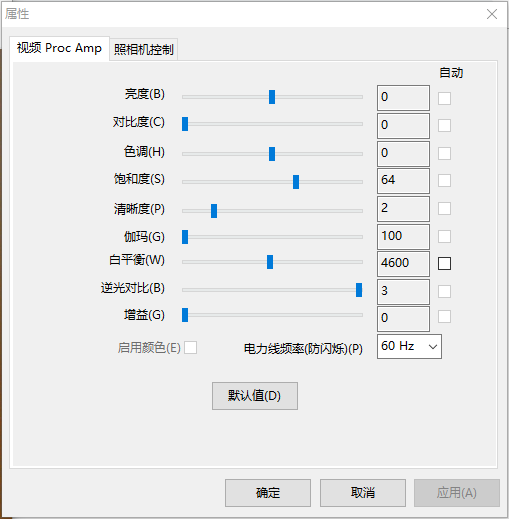为了取得好的图片效果,我们需要设置摄像头的参数。
假如摄像流为 cap, 那么设置参数是cap.set(参数编号,参数)
获取参数值的函数是 cap.get(参数编号)
看一段摄像头参数设置读取的例子吧,代码里先设置3个参数,然后再读取这3个参数。
import cv2
#选择摄像头号,一般从 0 开始
cap = cv2.VideoCapture(0)
#先设置参数,然后读取参数
cap.set(3,1280)
cap.set(4,1024)
cap.set(15, 0.1)
print("width={}".format(cap.get(3)))
print("height={}".format(cap.get(4)))
print("exposure={}".format(cap.get(15)))
while True:
ret, img = cap.read()
cv2.imshow("input", img)
# 按 ESC 键退出
key = cv2.waitKey(10)
if key == 27:
break
cv2.destroyAllWindows()
cv2.VideoCapture(0).release()我的程序运行结果是:
width=1280.0
height=720.0
exposure=-1.0
宽,高,设置有效,而曝光量设置返回无效。
摄像头有哪些参数可以设置呢?参数编号的对应关系怎么样,请看下面列表。
0. CV_CAP_PROP_POS_MSEC Current position of the video file in milliseconds.
1. CV_CAP_PROP_POS_FRAMES 0-based index of the frame to be decoded/captured next.
2. CV_CAP_PROP_POS_AVI_RATIO Relative position of the video file
3. CV_CAP_PROP_FRAME_WIDTH Width of the frames in the video stream.
4. CV_CAP_PROP_FRAME_HEIGHT Height of the frames in the video stream.
5. CV_CAP_PROP_FPS Frame rate.
6. CV_CAP_PROP_FOURCC 4-character code of codec.
7. CV_CAP_PROP_FRAME_COUNT Number of frames in the video file.
8. CV_CAP_PROP_FORMAT Format of the Mat objects returned by retrieve() .
9. CV_CAP_PROP_MODE Backend-specific value indicating the current capture mode.
10. CV_CAP_PROP_BRIGHTNESS Brightness of the image (only for cameras).
11. CV_CAP_PROP_CONTRAST Contrast of the image (only for cameras).
12. CV_CAP_PROP_SATURATION Saturation of the image (only for cameras).
13. CV_CAP_PROP_HUE Hue of the image (only for cameras).
14. CV_CAP_PROP_GAIN Gain of the image (only for cameras).
15. CV_CAP_PROP_EXPOSURE Exposure (only for cameras).
16. CV_CAP_PROP_CONVERT_RGB Boolean flags indicating whether images should be converted to RGB.
17. CV_CAP_PROP_WHITE_BALANCE Currently unsupported
18. CV_CAP_PROP_RECTIFICATION Rectification flag for stereo cameras (note: only supported by DC1394 v 2.x backend currently)这里是可能可以设置的参数,摄像头不一样,有些参数可能是不能设置的。
一般读取返回-1 的就是无效,下面再看一段检测有效无效的代码,就是上面代码改的
import cv2
#选择摄像头号,一般从 0 开始
cap = cv2.VideoCapture(0)
#先设置参数,然后读取参数
for i in range(47):
print("No.={} parameter={}".format(i,cap.get(i)))
while True:
ret, img = cap.read()
cv2.imshow("input", img)
# 按 ESC 键退出
key = cv2.waitKey(10)
if key == 27:
break
cv2.destroyAllWindows()
cv2.VideoCapture(0).release()运行结果是:
0=0.0
1=0.0
2=-1.0
3=1280.0
4=720.0
5=30.0
6=842094158.0
7=-1.0
8=-1.0
9=0.0
10=0.0
11=0.0
12=64.0
13=0.0
14=0.0
15=-1.0
16=1.0
17=-1.0
18=-1.0
19=-1.0
20=2.0
21=-1.0
22=100.0
23=4600.0
24=-1.0
25=-1.0
26=-1.0
27=-1.0
28=-1.0
29=-1.0
30=-1.0
31=-1.0
32=3.0
33=-1.0
34=-1.0
35=-1.0
36=-1.0
37=-1.0
38=-1.0
39=-1.0
40=1.0
41=1.0
42=1400.0
43=-1.0
44=-1.0
45=-1.0
46=-1.0
可以看到我的摄像头哪些参数可以设置,不为-1的。
在程序中编号很容易弄错,可以用如下方式比较好看一点,也不容易出错。
cap.set(cv2.CAP_PROP_FRAME_WIDTH,1280)
cap.set(cv2.CAP_PROP_FRAME_HEIGHT,1024)
cap.set(cv2.CAP_PROP_EXPOSURE, 0.1)
上面表不完整,但基本都包括了我们看看现在opencv 里面怎么说的:
https://github.com/opencv/opencv/blob/master/modules/videoio/include/opencv2/videoio.hpp
enum VideoCaptureProperties {
CAP_PROP_POS_MSEC =0, //!< Current position of the video file in milliseconds.
CAP_PROP_POS_FRAMES =1, //!< 0-based index of the frame to be decoded/captured next.
CAP_PROP_POS_AVI_RATIO =2, //!< Relative position of the video file: 0=start of the film, 1=end of the film.
CAP_PROP_FRAME_WIDTH =3, //!< Width of the frames in the video stream.
CAP_PROP_FRAME_HEIGHT =4, //!< Height of the frames in the video stream.
CAP_PROP_FPS =5, //!< Frame rate.
CAP_PROP_FOURCC =6, //!< 4-character code of codec. see VideoWriter::fourcc .
CAP_PROP_FRAME_COUNT =7, //!< Number of frames in the video file.
CAP_PROP_FORMAT =8, //!< Format of the %Mat objects returned by VideoCapture::retrieve().
CAP_PROP_MODE =9, //!< Backend-specific value indicating the current capture mode.
CAP_PROP_BRIGHTNESS =10, //!< Brightness of the image (only for those cameras that support).
CAP_PROP_CONTRAST =11, //!< Contrast of the image (only for cameras).
CAP_PROP_SATURATION =12, //!< Saturation of the image (only for cameras).
CAP_PROP_HUE =13, //!< Hue of the image (only for cameras).
CAP_PROP_GAIN =14, //!< Gain of the image (only for those cameras that support).
CAP_PROP_EXPOSURE =15, //!< Exposure (only for those cameras that support).
CAP_PROP_CONVERT_RGB =16, //!< Boolean flags indicating whether images should be converted to RGB.
CAP_PROP_WHITE_BALANCE_BLUE_U =17, //!< Currently unsupported.
CAP_PROP_RECTIFICATION =18, //!< Rectification flag for stereo cameras (note: only supported by DC1394 v 2.x backend currently).
CAP_PROP_MONOCHROME =19,
CAP_PROP_SHARPNESS =20,
CAP_PROP_AUTO_EXPOSURE =21, //!< DC1394: exposure control done by camera, user can adjust reference level using this feature.
CAP_PROP_GAMMA =22,
CAP_PROP_TEMPERATURE =23,
CAP_PROP_TRIGGER =24,
CAP_PROP_TRIGGER_DELAY =25,
CAP_PROP_WHITE_BALANCE_RED_V =26,
CAP_PROP_ZOOM =27,
CAP_PROP_FOCUS =28,
CAP_PROP_GUID =29,
CAP_PROP_ISO_SPEED =30,
CAP_PROP_BACKLIGHT =32,
CAP_PROP_PAN =33,
CAP_PROP_TILT =34,
CAP_PROP_ROLL =35,
CAP_PROP_IRIS =36,
CAP_PROP_SETTINGS =37, //!< Pop up video/camera filter dialog (note: only supported by DSHOW backend currently. The property value is ignored)
CAP_PROP_BUFFERSIZE =38,
CAP_PROP_AUTOFOCUS =39,
CAP_PROP_SAR_NUM =40, //!< Sample aspect ratio: num/den (num)
CAP_PROP_SAR_DEN =41, //!< Sample aspect ratio: num/den (den)
CAP_PROP_BACKEND =42, //!< Current backend (enum VideoCaptureAPIs). Read-only property
CAP_PROP_CHANNEL =43, //!< Video input or Channel Number (only for those cameras that support)
CAP_PROP_AUTO_WB =44, //!< enable/ disable auto white-balance
CAP_PROP_WB_TEMPERATURE=45, //!< white-balance color temperature
#ifndef CV_DOXYGEN
CV__CAP_PROP_LATEST
#endif
};其实参数取值范围很重要,看来我还是要查找资料。下面是别人的一个例子。
capture.set(CV_CAP_PROP_FPS, 30);//帧率 帧/秒
capture.set(CV_CAP_PROP_BRIGHTNESS, 1);//亮度
capture.set(CV_CAP_PROP_CONTRAST,40);//对比度 40
capture.set(CV_CAP_PROP_SATURATION, 50);//饱和度 50
capture.set(CV_CAP_PROP_HUE, 50);//色调 50
capture.set(CV_CAP_PROP_EXPOSURE, 50);//曝光 50 获取摄像头参数
要核实参数范围,我们用一个现成的软件,比如windows 的相机,或者AMcap,linux下的guvcview,cheese。
在设置好参数后,我们的python 程序获取他们的参数,是个比较好的办法。
然后用python运行获取所有参数:
for i in range(49):
if abs(cap.get(i)+1)>0.001:
print("{}.parameter={}".format(i,cap.get(i)))我的运行结果如下:
ipdb> 0.parameter=0.0
1.parameter=0.0
3.parameter=1280.0
4.parameter=720.0
5.parameter=30.0
6.parameter=842094158.0
9.parameter=0.0
10.parameter=0.0
11.parameter=0.0
12.parameter=64.0
13.parameter=0.0
14.parameter=0.0
16.parameter=1.0
20.parameter=2.0
22.parameter=100.0
23.parameter=4600.0
32.parameter=3.0
40.parameter=1.0
41.parameter=1.0
42.parameter=1400.0
在不知道参数范围的情况下调整参数比较盲目。
下面看我用Amp 的参数调整对话框,大致可以看出参数调整的范围。

最后
以上就是自觉万宝路最近收集整理的关于Python 下opencv 应用: 摄像头参数设置的全部内容,更多相关Python内容请搜索靠谱客的其他文章。








发表评论 取消回复